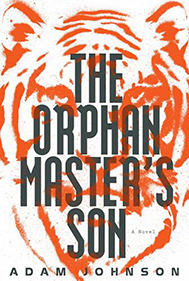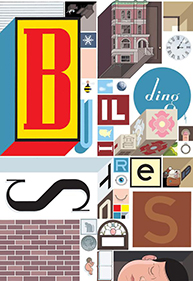by David Abrams
Buy on NOOK »-
March 25, 2013
Semifinals
-
Adam Johnson
2The Orphan Master’s Son
v.
4Building StoriesChris Ware
-
Judged by
Davy Rothbart
I met Chris Ware once, about 10 years ago, at WBEZ in Chicago, during a taping of the radio show This American Life. At this point, Ware had already penned his widely acclaimed graphic novel Jimmy Corrigan: The Smartest Kid on Earth, but I had no clue that this anonymous-looking, thirtyish dude with glasses, folded into a chair next to me inside the tiny studio, was the same guy being hailed by critics worldwide as one of the great artists of our time. He pulled out a sketchpad and over the course of the next hour, unspooled a badass drawing of host Ira Glass and former TAL producer Jonathan Goldstein. I watched the drawing slowly come to life, and finally, as the hour drew to a close, I turned to him and said, “Hey man, you’re a damn good draw-er. That looks awesome!” He looked up toward me and mumbled some kind of awkward thanks. It was as though I’d seen Yo-Yo Ma noodling around backstage at Radio City Music Hall and had tossed a few coins in his cello case.
Judging from Ware’s latest book, Building Stories, it appears that he’s still a damn good draw-er. Building Stories regards the tenants in a three-story Chicago brownstone apartment building—a woman with a missing leg, a bickering couple, and their elderly landlady. Their stories of love, loss, and longing are told through 14 printed booklets of various sizes and shapes; these mini-graphic novels, each told from separate points of view, are then collected into one handsome box. Not only is Ware a good draw-er, he’s a good story-er, and these interconnected stories are both exquisite and crushing.
When someone asked me a few months ago if I’d read Adam Johnson’s new book, The Orphan Master’s Son, I was initially confused. Wasn’t Adam Johnson the father of modern economics who’d died centuries ago? But of course that was Adam Smith, known for his prescient capitalist treatise The Wealth of Nations. Adam Johnson’s searing novel, on the other hand, takes place in North Korea, one of the poorest of nations. Its hero is Jun Do, a ward of the state who as a young man is tasked with a series of bizarre and sinister errands before being retired to a brutal prison camp. Later, he’s assigned to become a stand-in for a deposed military leader, falls in love with a famous actress named Sun Moon, and works to free her from Kim Jong-il’s totalitarian clutches. The book is terrifying, darkly funny, and vividly imagined—despite its heaviness, I enjoyed Adam Johnson’s writing far more than Adam Smith’s.
But how does The Orphan Master’s Son stack up against Chris Ware’s Building Stories? To compare two books so different in subject matter, style, and execution is a strange and difficult undertaking, like measuring Public Enemy’s Nation of Millions against a recording of Rigoletto, or Shaquille O’Neal against Twyla Tharp. How was I to pick a winner between two books I deeply admired?
Every time I got close to picking one book and passing it to the next round, I felt a pang of remorse, because it meant that at the same time I’d be eliminating a book I’d developed such fondness for. It was like two unbelievably adorable puppies had locked eyes with me at the Humane Society and I knew I could only take one home with me, while the other would be quietly euthanized. I realized, finally, that I was going to have to ask for help making the decision. After swearing them to absolute secrecy to preserve the sanctity of the Rooster, I shared my conundrum with a few trusted advisors.
First, I decided to consult some of my bookseller friends. The crucial, enduring role that indie booksellers play in literary culture can’t be overstated. When I want to know what book to read next, I turn to folks like Kevin Awakuni at Skylight Books in Los Angeles; Kevin Sampsell at Powell’s in Portland, Ore.; Ward Tefft at Chop Suey Books in Richmond, Va.; Benn, Rachel, and Maggie at Atomic Books in Baltimore; or any number of other amazing booksellers who are equally passionate and knowledgeable about the books they set out on their shelves.
I got a wide range of responses. From Paul Blaschko at Boswell Books in Milwaukee:
I recommend Building Stories like a maniac when people come into the store. My wife and I felt that we’d developed genuine relationships with the characters. While this in itself is not too odd (this happens a lot to us with fictitious characters), the odd part is that it felt like we were “meeting” and “interacting” with them in such a true-to-life sort of way. It was like we’d both met these people, and together, we were trying to piece together the stories of their lives.
But just as Blaschko and others began to tip the scales in Chris Ware’s favor, I heard from Erin Haire of Hub City Books in Spartanburg, SC:
For me, this is no contest. I loved, LOVED The Orphan Master’s Son. Like, I wanna be it for Halloween. I thought that it was so original, it was a story that I had never heard, and the author’s voice was so sure. The image that sticks with me is from an early chapter, when the main character is sent on that fishing boat to do radio surveillance. He describes how the fishermen butcher the fish onboard and then dump the chum into the ocean. He describes how giant squid come up from the depths to feed on this chum, and his description was just incredible. I think Ware’s work is very cool and deserves props for quality and definitely originality, but as far as actual literary achievement, The Orphan Master’s Son is it for me.
My next step was to send an email out to a few friends to help me break the deadlock. Again, both books had fierce advocates. Isaac Fitzgerald, managing editor of The Rumpus, who reads more books than anyone I know, wrote back to me right away: “The Orphan Master’s Son was hands-down my favorite read of 2012. A fantastical love story based in a horrifying reality. Reads like poetry, punches like a heavyweight.”
But just as I almost called it game, set, match on Adam Johnson’s behalf, I got a message from my friend Hayley Imerman in Toronto, who said she found Ware’s book “beautiful and heartbreaking.” A friend in Boston sent me a review of Building Stories by Steve Almond, whose work I love, in which Almond says that after a week of “sloppy communion” with Ware’s book, he’s “ready to declare it one of the most important pieces of art I have ever experienced.” And soon after, Dan Lewis wrote me from Minneapolis:
When I go to sleep after reading Chris Ware, my heart aches. Who hasn’t slept alone and longed for someone or slept with someone and longed to be alone? They say people who lie convincingly to themselves are happier in the long run. I believe Ware examines life and presents what it is like for those of us who can’t or choose not to lie about reality.
At a loss for how to select a winner, I decided to pick one favorite page from each book and read them over and over again to see which I liked better, a kind of prose cage match. From The Orphan Master’s Son, I picked a page in which Jun Do scoops rotted toes from the empty boots of a dying prisoner in a forced labor camp, unaware how close he is to undergoing a similar fate—it’s an absolutely vivid, lacerating, hopeless passage that won’t be easy to exile from my mind.
From Building Stories, I chose a gorgeous spread in which the building that houses the book’s characters actually begins to narrate for a moment:
Who hasn’t tried, when passing by a building or a home at night, to peer past half-closed shades and blinds hoping to catch a glimpse into the private lives of its inhabitants? Anything… the briefest blossom of movement… maybe a head, bobbing up… a bit of hair… a mysterious shadow… or a flash of flesh… seems somehow more revealing than any generous greeting or calculated cordiality (say, if the tenants were to suddenly be born unto the porch and welcome the voyeur, hands increasingly outstretched) … the disappointing diffusion of a sheer curtain can suggest the most colorful bouquet of unspeakable secrets.
This passage speaks so profoundly to our innate curiosity about the people we share the world with, the natural voyeurism that motivates us to read books in the first place, that it’s ultimately what has won this bout for Chris Ware. The Orphan Master’s Son has masterfully pulled back the curtain on life in North Korea—and, as Dennis Rodman’s recent unexpected visit seems to indicate, we may soon begin to learn much more about our planet’s most mysterious country—but Building Stories has pulled a curtain back on what it means to be human. For that, I say that Chris Ware is not only a good draw-er, but the best damn writer of 2012.
Match Commentary
By Kevin Guilfoile & John Warner
Kevin: Weeks ago, when I was first looking over the Rooster brackets, I glanced ahead, projecting some of the late round matchups that might be, and I made a casual note to myself: It will be interesting if Building Stories makes it to Davy Rothbart.
Not because I know Judge Rothbart—I don’t think we’ve ever met. I’m familiar with his work, though, at Found Magazine and on This American Life, and I’ve read his essays elsewhere. And Building Stories just struck me as a book—an object, a work of art—that he would really dig.
Writing these commentaries I have often gone back to the texts for a quote, or to remind myself of a character’s name, etc. But three times now, as Chris Ware’s book has come up for judgment, I’ve pulled Building Stories off the shelf, and three times I’ve gotten lost in it all over again. You can’t even properly call what you do with Building Stories reading. It’s more like a search. It’s about discovery.
Maybe that’s been unfair to the books it’s come up against. While I’m thrilled Building Stories is moving on, I am somehow also devastated that The Orphan Master’s Son won’t be. I thought it was an amazing book when I read it last year, and the discussion about it here has only increased my admiration for it.
Everyone in the comments, no matter what you say, I agree with you.
John: As I made clear, my objectivity over The Orphan Master’s Son is compromised because Adam Johnson and I are (in his words, actually) homies. Since the Tournament started, I had the pleasure of spending some face time with Adam, as he visited my current employer (College of Charleston) as part of the Crazyhorse Writers Conference. What seeing Adam reminded me of is the depth of thought and care he brings to his work.
I heard stories about his research trip to North Korea, how, over the course of years, he managed to finagle a series of connections until he could get inside the country. He talked about all the books and testimony he read, about how he figured out the structure as he went. (This is worth a long-form essay in itself.)
It reminded me of something I already knew about him: He’s an obsessive (in a good way), and I think it shows in the work.
I think Chris Ware probably has that similar obsessive nature, a single-minded focus that won’t let go of a particular artistic problem until he’s solved it for himself. This helps create a kind of unity of effect in both of these works, a unity that’s not really a rational thing but emotional, and so when we experience these things as readers, what we’re tapping into is something with soul. Both of these books showed up in high proportion in our prediction contest, and I think that’s why.
Kevin: I think Davy Rothbart might be the first judge in ToB history to openly solicit other opinions about how he should rule. I don’t think there’s anything wrong with that, and I found the range of opinions he received really interesting to read. It got me thinking, though, because the process kind of changed the premise of his deliberation. What had been one question, asked of himself, “Which book do I like better?” became an entirely different question asked of others, “Which book should I like better?”
I think that represents a fear that hangs over all of us during Rooster time, and it’s kind of fun that Judge Rothbart puts it out there so explicitly. All but the most arrogant among us will question whether our opinion is “right,” or wonder what it says about us that we like Arcadia more than How Should a Person Be? or vice versa.
A huge part of the delight and anguish of the tourney is having our tastes validated or disregarded. Obviously, it’s all artificial. Simply shuffling these same judges would result in a completely different bracket. That’s how tenuous a hold any novel has on its claim to being the Best Book of the Year.
Still, the map of our opinions, drawn over the course of this month, says something about who each of us is. And that’s exciting.
John: I have to admit that my first read of Rothbart’s method did not sit well with me. First, to some degree it breaks the great wall of silence surrounding these proceedings, something we take very seriously, where violations would be punishable by death, if we were capable of such things.
Kevin: Oh yeah. I didn’t think about that. Boo!
John: It also felt like a bit of a cheat. We’re looking for Davy Rothbart’s take, not friends of Rothbart.
But in the end, what it achieves is what you say. It reveals some of the many biases and prejudices that impact how we judge literature, particularly when that judgment is made public and there’s a live rooster at stake. I don’t actually question whether or not my take on a book is “right” until something or someone forces me to take up that question. Our ToB does that, and within the ToB, Judge Rothbart’s judgment does it.
And at least he didn’t judge on the superior cover, or force us into a coin flip, as has happened in the past.
I hope there’s some good news for The Orphan Master’s Son in the Zombie voting. When I asked him about possibly winning, Adam said that he’d be proud to be the first to take the actual live rooster, which is, I think, a sort of dream come true for us. I don’t want that dream to die yet.
Kevin: Building Stories advances to the Zombie Round, where it will meet an as-yet-unknown opponent, chosen by our readers. Tomorrow, Gone Girl will face How Should a Person Be? for the same honor.
And now we go back to the ballots to determine who is currently at the top of the Zombie contenders, and I do this now with added anxiety, because I too want someone to actually go home with a live rooster.
Wow.
In a contest that is Ohio close, The Orphan Master’s Son edges Arcadia by just one tenth of one percent of the vote.
So goodbye Lauren Groff. Next time you are home, give my regards to Lake Street. Order a slice for me at Sal’s. The rest of you who haven’t already, read Arcadia. I really loved it.
And with just one match to go before the Zombies, we know that at least one of the two—The Fault in Our Stars or The Orphan Master’s Son—will be returning to the bracket later this week.
























